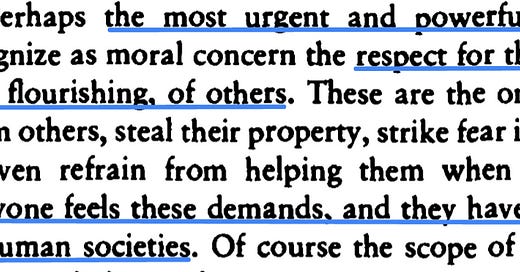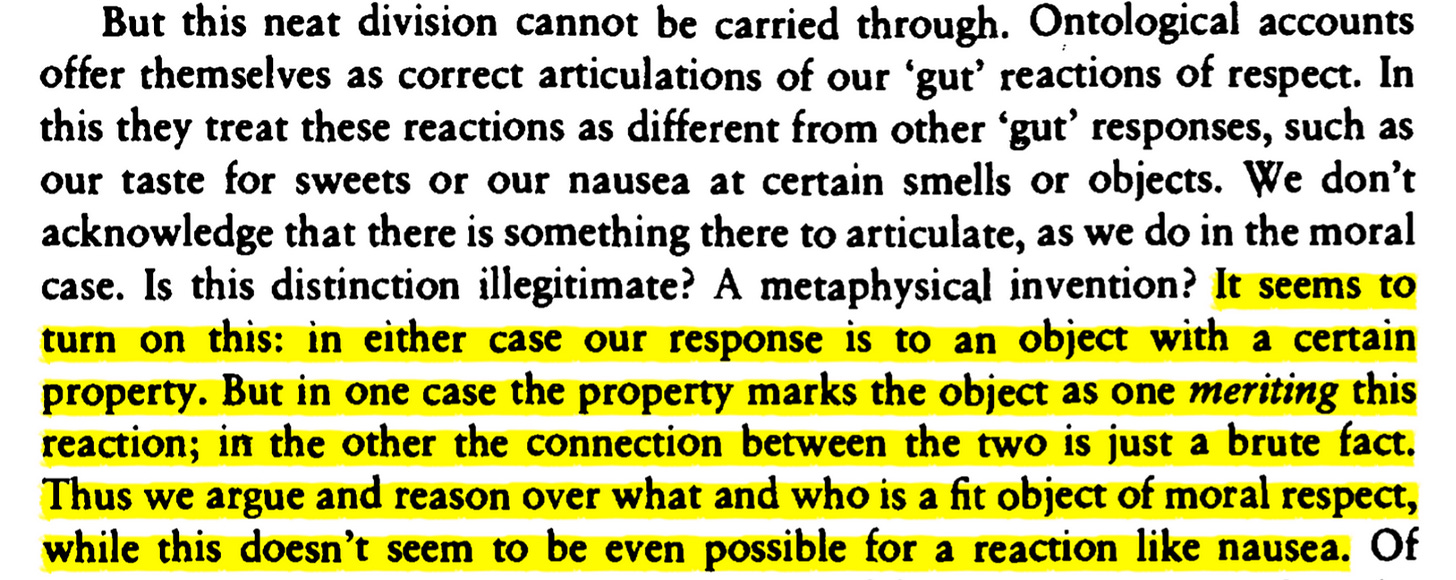Kyborg 19: SOS 3
Hard and Soft Inquiry
There are two poles to intellectual inquiry - I will call them ‘hard’ and ‘soft.’
Hard approaches make precise claims, draw strict boundaries and generally try to capture their object of investigation in their conceptual net. They have a tendency towards reduction and (over)simplification. When the hard approach works, it makes every other approach redundant, like what’s happened with planetary motion. Before Newton, it might have still been possible to imagine the Moon and Venus influencing your mood or cursing your business rivals, but which serious thinker today would go that route?
The ‘soft’ approach, in contrast, draws fuzzy boundaries when it draws them at all. It’s comfortable with multiple perspectives and reduction is frowned upon. There’s always something more to learn and a new variable to incorporate.
A hard approach to morality might say axiomatically:
The space of all morally relevant beings includes all humans (and soon, great apes and then, all mammals and a little later all living creatures).
Within that space, all the morally relevant beings are treated equally. When formulating a policy, it should not matter whether you’re a being of type A or a being of type B as long both of you are morally relevant beings.
It’s setting up the rules of the moral game as fixed from the beginning and immune to considerations from the rest of society. In contrast, Taylor is a softie who thinks selfhood and morality are joined at the hip.
He wants that connection between selfhood and morality to be compelling, i.e., they aren’t motivated by a random concern he’s invented but in deep and widespread intuitions about the dignity and value of human life.
Then the question arises: how to explain this ‘respect for the life, integrity, and well-being, even flourishing, of others’? In our naturalistic age, we are likely to offer a biological or psychological explanation. One that says humans have a moral instinct that makes us averse to killing or harming other humans just as we might have an instinctual aversion to certain smells and textures.
Turning morality into a biological instinct makes possible the kind of research program that gets massive funding from the NIH with legions of researchers trying to locate the neural and evolutionary pathways from which that moral instinct arises.
We are even more likely to offer such an explanation today than when Taylor wrote this book because of the explosion of research in evolutionary psychology and neuroscience in the three decades that have passed. How else will we explain the scale of our concern?
But Taylor has a very interesting line of attack against naturalism when it comes to morals. His criticism has two legs. First: humans have moral worth because of our ontological status as humans (though we may disagree about the source of that ontological status - it could be because we are the special creatures of god, we are uniquely rational etc).
Second: other instincts such as our aversion to smells have no such ontological intuition backing them:
As good an evocation of the ‘human question’ (I covered the human question in the second week of the Kyborg series, starting here) as any.
The core of Taylor’s argument: The human qua human necessarily invokes a metaphysical being and not just biological instincts.
And once we grant that metaphysical intuition its due, we are led to a further question:
What is our interface to that metaphysical being? I am using the term ‘interface’ in the way I articulated yesterday.
the answer to which is:
The Self.
In saying that the urgency of our moral concern is due to a metaphysical reason, Taylor is alerting us to a deep issue that we are barely scratching here: that there’s a long history of multiple orders of existence:
The order of nature
The order of reasons
Supernatural orders - totally out of fashion
Saying that the natural order is the only order and the others are superstitions is itself a modern superstition. Further, Taylor helps us see how two of these orders (the natural and the rational) meet in the ontology of the human. The force of that argument has to be met by anyone who wants to subsume all orders under the natural order.
The human being as the nexus of various orders of existence is at the very heart of the ‘human question’ and why modern thinkers return to it again and again.
The Logic of Metaphysics
One final technical point before I quit today:
Taylor argues that in some cases a feature (disgust, for example) can be explained on purely natural grounds while in other cases, a feature (moral worth for him) necessarily invokes an ontological account.
This argument can be generalized into a bigger question about logic and metaphysics:
Under what condition can a feature X be explained solely on the basis of other features of the same type X’, X’’ etc and when does an explanation necessarily involve features of a different type - Y, Y’ etc.
Staying within the realm of natural causes is of the first kind, since naturalistic explanations only involve features of the same type (i.e., all are causes, for example). But the minute you argue that a natural feature has a supernatural explanation, a miracle or a transcendental explanation (Kant will take us there) then we are crossing type boundaries in the act of explanation.
Independent of the way types could be different (natural/supernatural or formal/causal etc), it’s worth investigating logical systems that mix types.








